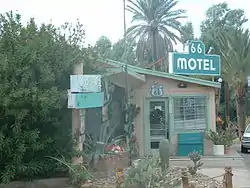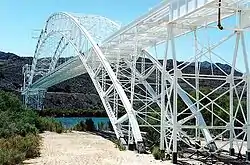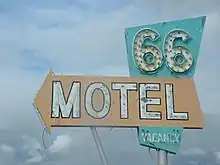66 Motel (Needles)
66 Motel, an independently owned six-room motel established 1946–47 in Needles, California, formerly served travelers on U.S. Route 66 in California. Bypassed circa 1970 by Interstate 40, the motel has been used as single room occupancy apartments since the 1990s.
| 66 Motel | |
|---|---|
 66 Motel in Needles CA, USA | |
 Location in California | |
| General information | |
| Location | Needles, California |
| Address | Desnok & East Broadway St. |
| Coordinates | 34.8335°N 114.5959°W |
| Opening | 1946–47[1] |
| Technical details | |
| Floor count | 1 |
| Other information | |
| Number of rooms | 6[2] |
| Number of restaurants | none |
| Parking | on-site |
The tiny independent motel is one of numerous U.S. Route 66 businesses which took the name of the now-historic highway in its heyday; there is also a 66 Drive-In cinema in Carthage, Missouri and a Route 66 Motel in Kingman, Arizona.
History
Needles, California, founded in 1883 was originally a stop on the Santa Fe Railway where it crossed from California into Arizona at the eastern edge of the Mojave Desert. Its first significant hotel, the El Garces Intermodal Transportation Facility, was built in 1908 to replace the original railway station.[3] In 1916, the Trails Arch Bridge brought the National Old Trails Road across the Colorado River; this span became part of U.S. Route 66 in 1926.
Campgrounds and cabins, initially primitive in design, sprang up at roadside during the 1920s and 1930s to accommodate motorcar traffic. Needles was significant as the first stop in California for automobile travelers.
The road runs parallel to the river, and it was well into the morning when the burning motors came to Needles, where the river runs swiftly among the reeds.
The Joads and Wilsons drove to the river, and they sat in the cars looking at the lovely water flowing by and the green reeds jerking slowly in the current. There was a little encampment by the river, eleven tents near the water, and the swamp grass on the ground. And Tom leaned out of the truck window. "Mind if we stop here a piece?"

In the 1940 film The Grapes of Wrath, the first sights on entering California were signs for the town of Needles and for "Carty's Camp", a group of tourist cabins (now abandoned and in disrepair) with a filling station.[5] After World War II, increased prosperity meant that travellers who once camped as "tin-can tourists" were now staying in a growing number of roadside motels along the highway.[6] Road travel would replace rail travel for an increasing number of passengers in the 1950s.
66 Motel, built soon after the war, was constructed (1946–47) in front of the historic Carty's cabin camp. In 1949, the old El Garces railway hotel accommodated its last overnight visitors.[1] In contrast with the older railway hotel, 66 Motel offered convenient proximity to the highway and modern amenities. In its heyday, the 66 Motel (like many other contemporary lodgings) offered air conditioning, TV, and kitchenettes, with neon signage pointing the way.[7]
Decline
The Red Rock Bridge, a former railway bridge, carried Route 66 traffic across the Colorado River from 1946 until the Interstate 40 crossing was built two decades later.[8] I-40 bypassed Needles c. 1970[1] and the long-abandoned Red Rock Bridge was dismantled in 1976, leaving I-40 as the only viable highway crossing eastward into Arizona.[8] An 11-mile stretch of US 95 through Needles was also pushed out of the town onto I-40 as part of a concurrency.
This left the motel and the Route 66 segment through the village bypassed and no longer part of the main road westward to Los Angeles.

Small independent Route 66 lodgings, on the town's now-bypassed main street but a mile or more from the nearest freeway exit, would be forced to compete with national chains building newer, larger properties directly adjacent to the I-40 off-ramps.
"This has been a dead place for a long time, This motel has a lot of potential, but what it boils down to is that Mama-and-Papa businesses in this country are dead, dead, dead. You need big business to do anything. All I want to do is get out of here."
— Marjud Paakkanen, 66 Motel's owner, in 1997[2]
As the small, independent motels relied on the visibility which came with a location on the main road of their era, business declined. By the 1990s, the 66 Motel was no longer taking overnight travellers and its much-photographed neon signage was deteriorating and no longer functional. The motel survived through monthly rentals as single room occupancy.
Preservation
In 2012, a private fundraising effort led by Ed Klein of Route 66 World raised almost three thousand dollars ($3000) toward the repair of the historic motel's neon signage;[9] the green 66 and red MOTEL flickered back to life as part of a re-lighting ceremony on the evening of June 23, 2012. Klein has plans to revisit the motel sign in the first half of 2021 to give it a touch up of paint and to check the neon's electrical system.
See also
References
- William Kaszynski (May 1, 2003). Route 66: Images of America's Main Street. p. 139. ISBN 9780786415533. Retrieved June 30, 2012.
- Ted Anthony, Associated Press (October 19, 1997). "Motels recall a bygone era". The Day (New London CT). pp. C7–C8.
- "Chapter 2: Needles Area". Socoloriver.com. Retrieved June 30, 2012.
- John Steinbeck (2006). "Chapter 18". The Grapes of Wrath. ISBN 9780143039433. Retrieved June 30, 2012.
- Maggie McShan (April 16, 2003). "Route 66 Motel Is a Rare and Priceless Attraction of the Mother Road" (Letter). Needles Desert Star. pp. 4–5. lists Steinbeck as having stayed at Carty's Camp, listing the property as the site of the later 66 Motel.
- Michael Karl Witzel; Jim Hinckley (October 16, 2010). Greetings from Route 66: The Ultimate Road Trip Back Through Time Along America's Mother Road. p. 215. ISBN 9780760338858. Retrieved June 30, 2012.
- Michael Karl Witzel; Gyvel Young-Witzel (October 15, 2007). Legendary Route 66: A Journey Through Time Along America's Mother Road. p. 226. ISBN 9780760329788. Retrieved June 30, 2012.
- Glen Duncan, California Route 66 Preservation Foundation (October 12, 2005). Route 66 in California. p. 16. ISBN 9780738530376. Retrieved June 30, 2012.
- Jennifer Denevan (April 16, 2012). "Volunteer working to restore sign". Needles Desert Star.